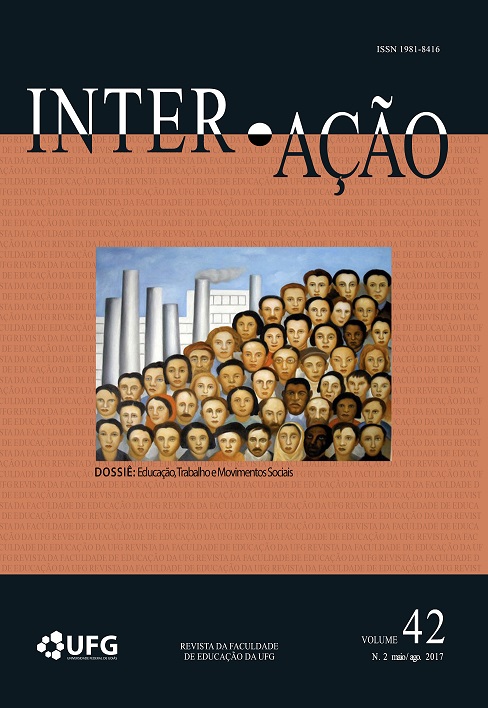O MOVIMENTO DOS TRABALHADORES SEM-TERRA E A EDUCAÇÃO EMANCIPATÓRIA EM TEMPOS DE CRISE SOCIOAMBIENTAL
DOI:
https://doi.org/10.5216/ia.v42i2.46120Palavras-chave:
MST, formação, crise, trabalhadoresResumo
O Movimento dos Trabalhadores Rurais Sem-Terra (MST) tem, desde sua origem, uma atenção especial para os espaços pedagógicos em sua dinâmica de atuação. Um importante local de formação do MST é a Escola Nacional Florestan Fernandes (ENFF), que existe desde 2005, na cidade de Guararema-SP. O objetivo deste trabalho foi pesquisar os cursos oferecidos na ENFF num recorte temporal de cinco anos (2011-2015), a partir do método da observação participante a fim de compreender a leitura que o MST faz neste momento de crise socioambiental, e, por conseguinte, sua proposta de formação educativa voltada para questões amplas da vida dos alunos e também para o mundo do trabalho. Concluiu-se que o MST tem estruturado cursos com essa temática específica e projetado novos cursos para os próximos anos. Palavras-chave: MST, formação, crise, trabalhadores.
Downloads
Publicado
Versões
- 2026-02-03 (2)
- 2017-12-07 (1)
Como Citar
Edição
Seção
Licença
Copyright (c) 2017 Revista Inter Ação

Este trabalho está licenciado sob uma licença Creative Commons Attribution-NonCommercial 4.0 International License.
A Inter-Ação utiliza como base para transferência de direitos a licença Creative Commons Attribution 4.0 para periódicos de acesso aberto (Open Archives Iniciative - OAI). Por acesso aberto entende-se a disponibilização gratuita na Internet, para que os usuários possam ler, baixar, copiar, distribuir, imprimir, pesquisar ou referenciar o texto integral dos documentos, processá-los para indexação, utilizá-los como dados de entrada de programas para softwares, ou usá-los para qualquer outro propósito legal, sem barreira financeira, legal ou técnica.
Autores que publicam neste periódico concordam com os seguintes termos:
1) Autores mantém os direitos autorais e concedem à revista o direito de primeira publicação, com o trabalho simultaneamente licenciado sob a Licença Creative Commons Attribution que permite o compartilhamento do trabalho com reconhecimento da autoria e publicação inicial nesta revista.
2) Autores têm autorização para assumir contratos adicionais separadamente, para distribuição não-exclusiva da versão do trabalho publicada nesta revista (ex.: publicar em repositório institucional ou como capítulo de livro), com reconhecimento de autoria e publicação inicial nesta revista.
3) Autores têm permissão e são estimulados a publicar e distribuir seu trabalho online (ex.: em repositórios institucionais ou na sua página pessoal) a qualquer ponto antes ou durante o processo editorial, já que isso pode gerar alterações produtivas, bem como aumentar o impacto e a citação do trabalho publicado.















